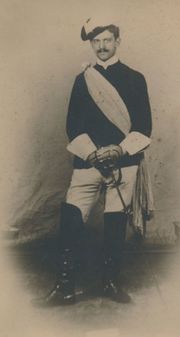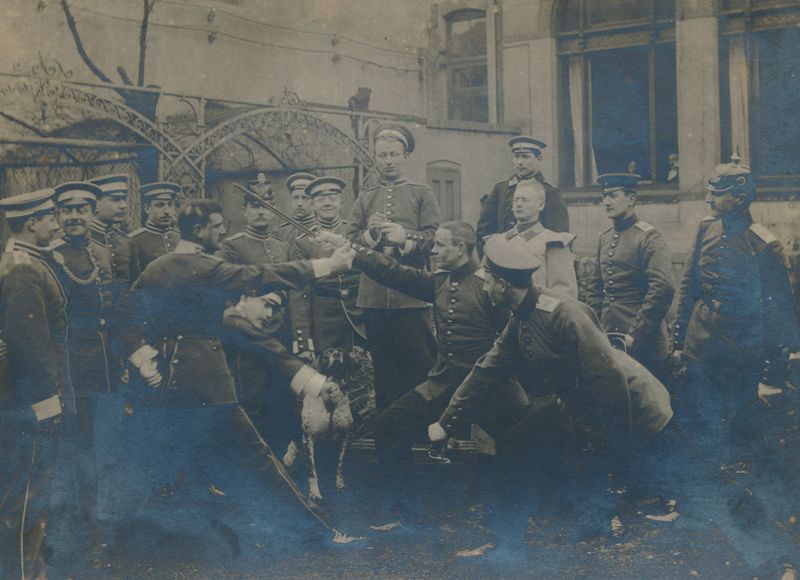Duell im Morgengrauen/en: Unterschied zwischen den Versionen
(Die Seite wurde neu angelegt: „Datei:1899_F02942_Berlin_Otto_Eckart_in_Uniform.jpg|180px|thumb|right|Otto Eckart in full gala of the "Deutscher Akademiker Verein" (German Association of Ac…“) |
Keine Bearbeitungszusammenfassung |
||
| (7 dazwischenliegende Versionen desselben Benutzers werden nicht angezeigt) | |||
| Zeile 2: | Zeile 2: | ||
[[Datei:1899_F02942_Berlin_Otto_Eckart_in_Uniform.jpg|180px|thumb|right|Otto Eckart in full gala of the "Deutscher Akademiker Verein" (German Association of Academics).]]"He was quite extraordinary in his way, this Otto Eckart." This is the beginning of the first short story from Wolfgang Hoppe’s manuscript "Geschichten zur Schummerzeit | [[Datei:1899_F02942_Berlin_Otto_Eckart_in_Uniform.jpg|180px|thumb|right|Otto Eckart in full gala of the "Deutscher Akademiker Verein" (German Association of Academics).]]''"He was quite extraordinary in his way, this Otto Eckart."'' This is the beginning of the first short story from Wolfgang Hoppe’s manuscript "Geschichten zur Schummerzeit" (Tales for the Twilight Hour), an odd and entertaining collection of short stories from the lives of the Eckarts. Wolfgang Hoppe compiled a manuscript of nearly 60 pages from a total of 22 such stories. The following story concerning Otto Eckart is based on this book. | ||
Otto Eckart, born in [[Familie_Eckart_in_München/en|Munich]], enjoyed spending his leisure time in the beer hall Augustinerkeller over a glass of beer. The recently graduated agronomist and reservist captain was immersed in his newspaper when he noticed a young lady at the neighboring table. Otto was charmed; he had a waiter whom he knew bring a bouquet of flowers to the lady’s table and convey his most faithful respects. The lady’s male companion was not really charmed and retorted by demanding a duel, as was customary in fraternity circles at that time. | |||
Already the next day, the enraged companion’s second stood in front of Otto’s apartment. He communicated the terms of the duel: sharp sabers and "sine", i.e., without protective clothing. He designated a remote glade in the floodplains of the river Isar as a venue for the duel. Three days later, a small group of people appeared at the designated place: the coachmen waited at a short distance from the scene, the two duelists, their respective seconds and a surgeon, who was specialized in fencing wounds and supposed to treat the inevitable injuries, inspected the place and examined the duel sabers. It was not long before the surgeon was required. Otto had lost part of his nose. Fortunately, the precious piece was found in the high grass and, after an injection to kill the pain, sewn back on immediately. The challenger had gained sufficient satisfaction for the dishonor experienced in the Augustinerkeller and the duel was terminated.<ref>Eckart Family Archive, Wolfgang Hoppe: "Geschichten zur Schummerzeit. Eine Sammlung wahrer Kurzgeschichten aus dem Leben." (Tales for the Twilight Hour. A Collection of True Short Stories Taken from Real Life.)</ref> | |||
[[Datei:1901 F03001 Gruppenbild gestelltes Duell.jpg|800px|thumb|none| | [[Datei:1901 F03001 Gruppenbild gestelltes Duell.jpg|800px|thumb|none|A reenacted duel. The duelist on the left is Otto Eckart. 1901.]] | ||
== | == References == | ||
Aktuelle Version vom 16. August 2021, 14:39 Uhr
"He was quite extraordinary in his way, this Otto Eckart." This is the beginning of the first short story from Wolfgang Hoppe’s manuscript "Geschichten zur Schummerzeit" (Tales for the Twilight Hour), an odd and entertaining collection of short stories from the lives of the Eckarts. Wolfgang Hoppe compiled a manuscript of nearly 60 pages from a total of 22 such stories. The following story concerning Otto Eckart is based on this book.
Otto Eckart, born in Munich, enjoyed spending his leisure time in the beer hall Augustinerkeller over a glass of beer. The recently graduated agronomist and reservist captain was immersed in his newspaper when he noticed a young lady at the neighboring table. Otto was charmed; he had a waiter whom he knew bring a bouquet of flowers to the lady’s table and convey his most faithful respects. The lady’s male companion was not really charmed and retorted by demanding a duel, as was customary in fraternity circles at that time.
Already the next day, the enraged companion’s second stood in front of Otto’s apartment. He communicated the terms of the duel: sharp sabers and "sine", i.e., without protective clothing. He designated a remote glade in the floodplains of the river Isar as a venue for the duel. Three days later, a small group of people appeared at the designated place: the coachmen waited at a short distance from the scene, the two duelists, their respective seconds and a surgeon, who was specialized in fencing wounds and supposed to treat the inevitable injuries, inspected the place and examined the duel sabers. It was not long before the surgeon was required. Otto had lost part of his nose. Fortunately, the precious piece was found in the high grass and, after an injection to kill the pain, sewn back on immediately. The challenger had gained sufficient satisfaction for the dishonor experienced in the Augustinerkeller and the duel was terminated.[1]
References
- ↑ Eckart Family Archive, Wolfgang Hoppe: "Geschichten zur Schummerzeit. Eine Sammlung wahrer Kurzgeschichten aus dem Leben." (Tales for the Twilight Hour. A Collection of True Short Stories Taken from Real Life.)

